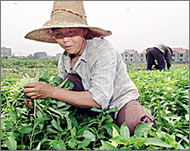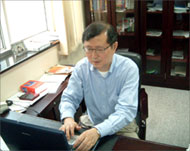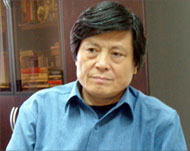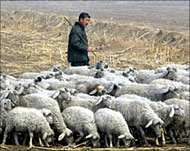Rural China’s obstacle course
Official focus in China is turning towards the unglamorous but increasingly pressing question of rural reform – after two decades of phenomenal urban development aided by a government eager to modernise.

Labelled a “top priority in all government work this year” by Prime Minister Wen Jiabao, the Chinese Government has good reason to be concerned.
Average salaries have been stagnating for the 800 million people, or 60% of the population who live off the land. Last year, while urban incomes averaged 8500RMB ($1026), those in the villages were a paltry 2622RMB ($316).
And when factors such as cost of education are taken into account, some Chinese professors have said the difference could be as great as a factor of six.
Add to that an annual loss of one to two million jobs in farm-related work, a poor 2003 harvest, the yearly depletion of 170,000 hectares of arable land due to urbanisation and desertification plus worries about the full effects of World Trade Organisation (WTO) membership on the agricultural sector, and it is clear why the rural economy now has the attention of China’s leaders.
Area of discontent
Conscious that their mandate to rule requires continual economic progress, the government knows it can ill afford an unhappy rural populace, which historically has been a source of major social upheaval.
 |
|
Annually one to two million jobs |
Although the exact number of rural protests can only be guessed at, complaints over the perceived mismanagement of the rural economy and society do boil over. In one demonstration in late 2002, an estimated 80,000 farmers publicly voiced their grievances over illegitimate land seizures and illegal taxes imposed by local officials.
In an effort to placate such concerns, the Chinese Government is focusing on both economic and political adjustments, says Zhu Lizhi of the government-run Centre of Agricultural Resources and Environment.
Believing that economic malaise is primarily to blame, market-orientated reforms are being touted as the panacea to the countryside’s ills, with plans to improve logistics, access to local and international markets, and greater freedom of crop plantation.
In 2002 averaging only 8mu (0.5 hectares), China’s ostensibly small, family-run farms have faced encouragement by the government to plant certain crops, in particular grain, which is seen as being of national importance, a throwback to the days when China was often wracked by famine.
Market panaceas
The result though is that grain and other land-intensive crops such as cotton and soybeans currently sell at 10-70% higher than international market prices.
Clearly, China is unable to compete with developed countries like the US who have access to heavy machinery and a better managed open field system.
|
“Lots of people in China who talk about WTO don’t have a clue what it is about. WTO in many ways is merely symbolic. Overall what is driving changes in agriculture US embassy official in Beijing |
Far better, say experts, would be for China to focus on labour-intensive crops, such as vegetables and flowers, for which vibrant export markets already exist, and so take advantage of the country’s low wage rates.
Partly in recognition of this, the government announced in May an end to the monopoly system on controls over grain production, thereby allowing market forces to play a greater role in pricing and distribution.
However, fearing the effects of WTO and partly trying to bolster rural incomes, they continue to subsidise farmers who produce grain, adding to a host of subsidies and tax reductions that according to official statistics have seen incomes jump by five percent this year.
Echoing such concerns over WTO, Xu Boyuan of the Ministry of Agriculture says membership would prove to be a negative force for China’s agriculture.
Responding to Aljazeera.net’s queries, he said in an email, “In the short term WTO will trigger several problems – add to the difficulties of selling domestic farm products and pressure for distribution, cause a price drop for some farm products in the domestic market, and prevent income growth of farmers and undermine their enthusiasm for farming.”
Unnecessary anxiety?
In a reflection of how the country’s agricultural community is split over the WTO’s possible impact, Zhu of the Centre of Agricultural Resources and Environment believes the organisation will play a positive role in accelerating the modernisation of Chinese farming.
“It will optimise the investment environment, open up the domestic market, absorb more foreign capital, technology and know-how and improve the export environment,” he told Aljazeera.net.
 |
|
Li: Many farmers do not know of |
An official of the US embassy in Beijing, who did not want to be named, said unnecessary anxiety is being aroused, referring to the more apocalyptic portents about the WTO.
“Lots of people in China who talk about WTO don’t have a clue what it is about,” said the official. “WTO in many ways is merely symbolic. Overall what is driving changes in agriculture is China’s economic development.”
For proof, the official pointed to China’s growing consumption demands that will help to stimulate the market plus the inclusion of import quotas as part of the WTO agreement.
These allow the Chinese government to limit the amount of imports to a small percentage of total consumption (no more than five percent on the part of grain), thereby allaying fears of a flood of cheaper foreign imports.
Corruption spectre
Trying to seize the opportunities available is complicated, however, by what has been described as widespread corruption in rural areas.
|
“In the short term Xu Boyuan, |
The source of ongoing protests, village, county and sometimes provincial-level officials are accused of levying unfair taxes and of using outdated land-redistribution laws to seize plots meant for farming and then selling it to developers.
“Even though in 2002 all land readjustment was prohibited, we found many farmers were ignorant of the new laws,” Li Ping of the Seattle-based Rural Development Institute (RDI) said.
Citing vested interests on the part of local officials in not informing farmers about recent amendments to the law, Li said officials at county and even provincial level sometimes form alliances aimed at obfuscating and hindering higher-level inspection teams from discovering any legal inconsistencies.
 |
|
Chen: Peasants can get beaten |
Such concerns have been substantiated by Chen Guidi, author of the hard-hitting book, Investigation into China’s Farmers, which was banned within a month of its publication.
Speaking to Aljazeera.net, Chen said problems of official corruption were widespread in the centrally located province of Anhui, where his investigations were based. “In many areas there is a problem of never-ending taxes but even when peasants know they are illegal and they try to complain, they get beaten up, sometimes even killed.”
In some places he visited, farmers were so poor they were reduced to selling their blood – a means of existence that in Hunan province gave rise to a HIV/AIDS outbreak.
New approaches
Perhaps partially indicative of the problems faced by central government in ascertaining the true picture of local-level compliance with the law, Premier Wen nowadays occasionally orders his motorcade to stop in random villages.
Great for public relations as a man of the people, it also allows him a chance to speak directly with the farmers, denying local officials the opportunity of stage-managing the whole affair.
A longer-term approach to the problem was the announcement at the start of the year by Chen Xiwen, an agricultural official with the State Council, that in the future the success of local officials would be measured not by GDP growth rates in their region – as was the norm – but by the amount with which farmer’s incomes were raised.
 |
|
Can market-oriented reforms be |
It was also announced in June that farmers would enjoy greater protection of their rights, a vaguely worded term that is supposed to recognise that farmers are currently under-represented and disadvantaged in society.
How this amendment to the law will work in practice has yet to be tested, although it may give farmers some reassurance if they can bring cases to court against egregious officials.
In any event, for all the corrective steps that have been taken, the central government still expects 300-500 million people to migrate to the cities by 2020, a movement of people that will be historically unprecedented in scale, fuelling further concerns over employment, housing and crime.
It looks like just as China is trying to get to grips with one problem, it will just as soon be facing another.